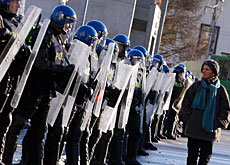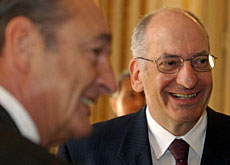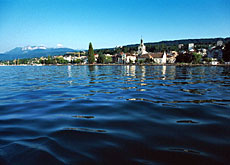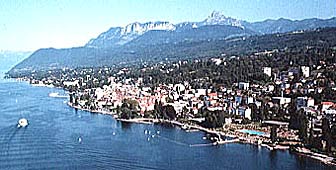G-8 summit exposes weakness of Swiss policing

Less than a month before the G-8 summit, a shortage of police officers is hampering preparations to control expected massive protests.
The problems are also calling into question Switzerland’s ability to deal with summits on a similar scale.
The meeting between the world’s seven most industrialised nations and Russia will take place in the French resort of Evian on the shores of Lake Geneva.
But the bulk of anti-globalisation protests – involving at least 100,000 demonstrators – are expected to be held in the neighbouring Swiss cities of Geneva and Lausanne.
A major demonstration is expected to take place in the centre of Geneva on June 1, when the summit kicks off.
Last weekend, the head of canton Geneva’s G-8 task force, Micheline Spoerri, launched an emergency appeal for an additional 1,500 police officers to deal with the protests.
Appeal
Cantonal police chiefs met in Bern on Monday to discuss Spoerri’s appeal, but only agreed to provide 800 extra officers.
According to the head of Switzerland’s G-8 Coordinating Committee, Pierre Aepli, the summit underscores major deficiencies within the country’s police system.
“It’s brought to light the difficulties we have in Switzerland to mobilise forces to face such events,” Aepli told swissinfo. “Our federal structure prevents us from easily dealing with such events so we have to rethink this structure and improve it.”
Unlike countries such as the United States, which has a national guard and the FBI, Switzerland does not have a federal police force.
Security and protection
Instead, the responsibilities of security and civil protection are a cantonal matter, making it difficult to coordinate efforts and mobilise forces on a nationwide scale.
Aepli, who is also a former cantonal police chief, would like to see the creation of a coordinated cantonal police force, which could be called upon during major international conferences and events, such as the G-8.
“This would give Bern the possibility of rapidly mobilising these forces, if necessary… But it would also mean that the forces would remain in the cantons’ hands and form part of their own police forces,” he said.
The federal government and cantonal police directors are currently in the process of examining Switzerland’s internal security system.
The Police and Justice Ministry told swissinfo that lessons learned during the G-8 would be incorporated into these discussions.
International reputation
Aepli points out that Switzerland’s reputation abroad could be damaged if it is perceived as incapable of dealing with large-scale events.
Switzerland often hosts international gatherings and conferences, such as the annual World Economic Forum (WEF) summit in Davos and the upcoming World Information Summit in Geneva.
Aepli says it is essential for Switzerland to adapt its police system to better cope with the increasingly violent nature of demonstrations, along with the growing threat of international terrorism.
“We have to ensure that our police forces, especially in Geneva, are kept at necessary levels to be able to fulfil our mission and welcome international conferences,” he told swissinfo.
“If we do not do that, we have to accept that Geneva and other towns in Switzerland will find it difficult to maintain their international position,” he added.
Pushed to the limit
Jean René Fournier, a senator from canton Vaud, agrees that the Evian summit is likely to push Switzerland to its limits.
“Gatherings like the G-8 and the WEF show that if Switzerland wants to organise large events, it has to be given the means to do it,” Fournier told the French-speaking magazine, “Le Nouvelliste”.
“I believe we need cantonal forces that can be called upon and directed by Bern during times of need.”
Foreign assistance
It has been suggested that Switzerland could draft in foreign police officers from Germany to help with the G-8, under an accord signed between the two countries in March 2002.
But the Justice and Police Minister, Ruth Metzler, has opposed the idea, saying that “political and psychological considerations would not permit it”.
For his part, Aepli agrees that foreign officers should only be used as a last resort.
“If a country is not able to master the problems it faces, where is the sovereignty of that country?” he said. “We have to take the necessary measures to control and master our problems ourselves.”
swissinfo, Anna Nelson in Geneva
The G-8 meeting will take place from June 1-3 near the Swiss border in the French town, Evian.
Swiss authorities fear the bulk of anti-globalisation protests will take place in Geneva and Lausanne.
Some 10,000 law enforcement officials are expected to take part in security operations in Switzerland.
Canton Geneva says 700 officers are still needed and that the shortage is hampering security preparations.

In compliance with the JTI standards
More: SWI swissinfo.ch certified by the Journalism Trust Initiative



You can find an overview of ongoing debates with our journalists here. Please join us!
If you want to start a conversation about a topic raised in this article or want to report factual errors, email us at english@swissinfo.ch.